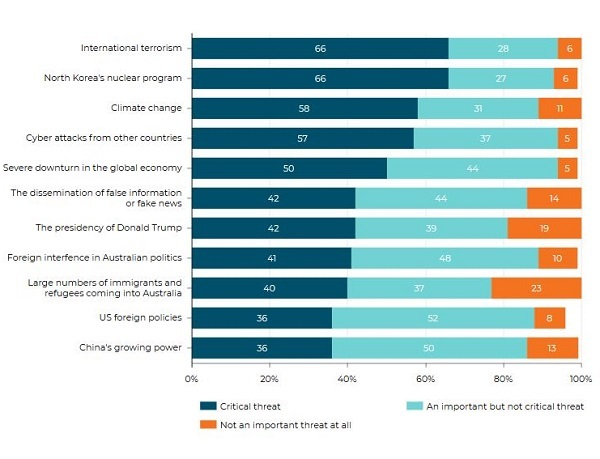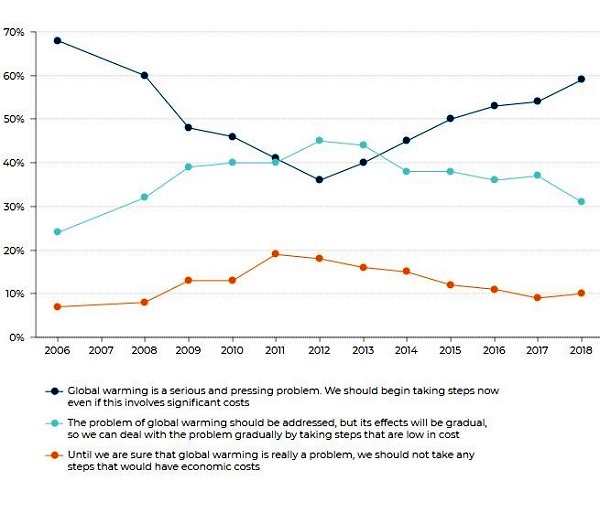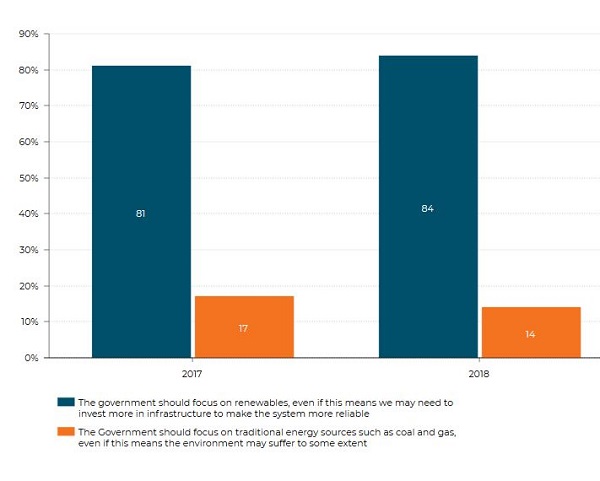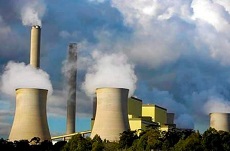In the Lowy Institute Poll 2018 (interactive version here) respondents were asked to rate 11 threats to Australia’s vital interests as (1) a critical threat, (2) an important but not critical threat, or (3) not an important threat at all. Here’s the result:

At 58% climate change came third. However, a stubborn 11% thought climate change not a threat at all.
Asked about climate change directly the report says:
-
Attitudes about climate change have been undergoing a dramatic reversal over the past six years. The number of Australians who saw global warming as a ‘serious and pressing problem’ about which ‘we should begin taking steps now even if this involves significant costs’ fell from 68% in 2006 to 36% in 2012. Since then, however, concern about global warming has been rising steadily. In 2018, almost six in ten Australians (59%) say global warming is ‘a serious and pressing problem’, up five points since 2017 and 23 points since 2012.
The issue of climate change and global warming continues to split Australians along generational lines. While a clear majority (70%) of younger Australians aged 18–44 see ‘global warming’ as a ‘serious and pressing problem’, just less than half (49%) of their elders have the same level of concern.

On renewables:
- most Australians have not been persuaded to support coal over renewables for the nation’s energy security. Almost all Australians remain in favour of renewables, rather than coal, as an energy source. In 2018, 84% (up three points since 2017) say ‘the government should focus on renewables, even if this means we may need to invest more in infrastructure to make the system more reliable’. Only 14% say ‘the government should focus on traditional energy sources such as coal and gas, even if this means the environment may suffer to some extent’.

- Even among those who take the most sceptical view about global warming (the 10% who say ‘until we are sure that global warming is really a problem, we should not take any steps that would have economic costs’), 40% favour a focus on renewables. Nine in ten of the rest support a focus on renewables rather than coal, as do 72% of Liberal-National Party supporters. (Emphasis added)
Back in 2016:
- most Australians (88%) agreed that ‘the use of fossil fuels is in decline around the world and Australia should invest more in alternative energy sources or risk being left behind’. Only 53% agreed (45% disagreed) that ‘Australia has an abundant supply of fossil fuels and we should continue to use and export them to keep our economy strong’.
Currently the Energy Security Board (ESB) is scurrying to complete the final version of the National Energy Guarantee (NEG) policy to be voted on by COAG on August 10. A 52-page document was produced last week, with 10 working papers on technical aspects to follow this week. Final feedback is due by July 13.
If the states all agree at COAG then it seems the final hurdle will be the LNP party room.
Giles Parkinson at RenewEconomy has discussed these developments in three articles:
Then there were three interviews on ABC RN’s Breakfast on 26 June in anticipation of a meeting with the government’s backbench energy committee where representatives of despite the urgings of the manufacturing, mining, business and agricultural sectors who supported the NEG, plus an earlier podcast at RenewEconomy:
- ABC RN Breakfast – Josh Frydenberg talks to Hamish Macdonald
- ABC RN Breakfast – Craig Kelly. Chairman of the Backbench Committee on Energy and Environment
- ABC RN Breakfast – Politics with Paul Bongiorno
- RenewEconomy – Special Podcast: Mark Butler on the NEG and EVs (13 June) (Click on the button at the bottom.)
See also my earlier post NEG: the plan to do less than nothing.
To cut to the chase, Mark Butler says Labor is concerned that the NEG do no harm, and that it can be ramped up to a meaningful target if Labor attains power. He reminds us that Labor’s target of a 45% reduction by 2030 is for the whole economy. In order to achieve this the electricity sector must do more than its arithmetical share.
It seems clear from the Parkinson articles that the NEG is designed to do actual harm, essentially to give existing and new coal and gas their best chance (Frydenberg actually says it), to put renewable energy in a deep freeze for 10 years, and to give ‘business certainty’ by legislating to prevent a future government from increasing targets.
Bongiorno says that Frydenberg is walking on eggshells under threat that a bunch of Liberals and half the National Party will cross the floor if they don’t get what they want. This, apparently, is an overt commitment to coal.
Some of the provisions are weird.
Responsibility for meeting targets will be assigned to the retailers, not to the generators. It appears that there will be penalties for over-achievement. This seems to imply that retailers may be unable to buy available renewable energy if it exceeds the target.
Tell me this is not true. It seems like an invitation to go off-grid for those companies able to do so.
Then there is something about what retailer are buying and for what price will be on a closed registry.
If states choose “irresponsible” targets, above the 26% Paris commitment, then other states will be able to underachieve by the same amount.
Tony Abbott is right, we should not have joined the Paris Accord. The external affairs powers of the Commonwealth deals them into the game. If I’m right and electricity is a state responsibility under the Constitution, we would all be better off if the Commonwealth butted out.
David Leitch in NEG: Irrelevant at best, harmful at worst says:
- The NEG does nothing: It won’t lower prices, it won’t reduce the large gentailer influence, it won’t bring about the new investment required … it has no commitment to change. In short, it’s fraud as far as policy goes, or at best, a fix.
A political fix, that is.
He thinks that Victoria, QLD and the ACT will choose optics over hard work and simply demand a price for letting the NEG through.
With apologies to Xavier Herbert, poor fellow my country!


Phillip Coorey in the AFR reports:
He says that at the meeting of Coalition MPs on Tuesday, 14 members rose to speak in support of the NEG while just four – Tony Abbott, Eric Abetz, Craig Kelly and Barnaby Joyce – spoke against.
This ignores the fact that the current NEG draft is very pro-coal. Then there was this:
Another thing that is giving me the irrits is that the government is claiming credit for recent reductions in the wholesale electricity price, which is starting to flow through into cheaper electricity bills for consumers.
Attempting to clean up my desk today.
Back on 22 May from the AFR, the ESB in a mad dash to finalise the NEG put out the call for more staff. They already had 25-30 secondees, mainly from regator bodies such as AEMO, but were then seeking secondments from:
Also found a reference to an article from 15 February, which said:
That was headlined as a backdown. Obviously they reversed the backdown because the fossils in their own ranks.
Is a ‘gentailer’ a company that either generates OR retails?
Just wondering.
Ambi, I think gentailer means both generator and retailer.
The biggies are AGL, Orica and EnergyAustralia (which is actually owned by Hong Kong-based and listed CLP Group).
I think they are regarded as self-evidently evil by the ACCC.
Today, on Radio 2GB, Ray Hadley was trying to get the Federal Minister for Environment and Energy, Josh Frydenberg, to commit to building new coal-fired power stations in Australia, link to podcast here. Hadley was unsuccessful.
Following Frydenberg’s chat, a caller “Richard” came on the air, spouting some statistics about US energy production from the US Energy Information Administration (EIA).
I phoned Radio 2GB to draw attention to the BP Statistical Review of World Energy 2018 (67th Edition) report, published on June 13, link here, where:
On page 12: US proved oil reserves-to-production (R/P) is only 10.5 years;
On page 26: US proved gas reserves-to-production (R/P) is only 11.9 years.
In 2017, the US was the world’s largest oil and gas producer, and consumer.
If the rest of the world cannot make up the shortfall as US oil and gas production inevitably declines, and it seems likely soon, then there will be global shortages of oil and gas, unless global demand falls.
I didn’t get on air – I think the information appeared to be too inconvenient for the narrative that Hadley seems to push.
Shale Reality Check 2018, link here, in the Executive Summary includes:
As I’ve said before:
– Humanity must leave petroleum oil, before oil leaves us;
– Humanity must leave fossil natural gas, before gas leaves us;
– Humanity must leave petroleum oil, fossil natural gas, and coal, before 2050, to mitigate dangerous climate change.
But it seems no politician will dare acknowledge this. Australians need to wake up and demand emergency action.
Worth trying by phoning Radio 2GB directly. Good attempt, Geoff M.
By the way, dose Mr Hadley understand engineering, energy economics, and atmospheric science?
Ambigulous (Re: JUNE 27, 2018 AT 6:45 PM):
I don’t see any evidence that he does. And yet he comments on it almost daily. Go figure!
Just do what you can. When reality does collide with reality and the inevitable disaster strikes most of us down, at least you will have a clear conscience.
Having been in a few Northern Hemisphere winters, I wonder how the enthusiasts for fossil energy will get on when the oil and gas run out and the marvellous coal is put out of their reach? Go nuclear? Yeah, right; of course; why didn’t I think of that? Or, huddle together for warmth and make fires with the furniture and floorboards, perhaps?
A tiny weeny glimmer of hope from us folks way up here in Boaganland: there are now small-scale experiments in the use of tidal power being conducted in Gladstone harbour.
Boaganland now?

I thought it was called Boganville?
When did I miss the Referendum?
Ambigulous: Yeah, they used to call it Port Curtis District and nearly made it a separate colony, then it became Central Queensland, but when they changed the official religion to the worship of coal and abandoned any attempt at diversification of industry, they changed the name to Boaganland. (The capital is Rockvegas, by the way). Anyhow, the new owners will probable give it a new name: Mei Kuang Zhimindi (Coal Mines Colony).
Personally I prefer Port Curtis District to Coal Mines Colony.
Hong Kong is lucky to have One Govt Two Systems. Port Curtis might have to be satisfied with One System.
Will Port Curtis maintain relations with Batman Cattle and Dairy Colony? Capital was Footyville.
Graham Bell (Re: JUNE 28, 2018 AT 9:08 PM):
Good question. But petroleum oil and fossil natural gas won’t run out – there will always be some in the ground. It’s a question of:
1. The rate of energy supply – large in situ resources do little good if they cannot be produced consistently and in large enough quantities – e.g. oil shale, gas hydrates, in situ coal gasification;
2. The net energy yield – i.e. the difference between the energy input required to produce the resource and the energy contained in the final product – EROI. Lower EROI translates to higher production costs, lower production rates, and usually more collateral environmental damage in extraction.
And then there’s this ‘little’ pesky problem of human induced Climate Change, by the burning of vast quantities of fossil fuels, producing an existential risk to humanity.
– It’s now too late for nuclear – it takes too long to build;
– It’s now more expensive than renewables – no longer competitive;
– Permanent high level nuclear waste disposal solution still unresolved.
– Uranium and thorium are finite, non-renewable, one-time-use, depleting resources – not sustainable long-term.
That’s a very real prospect if our society/civilization doesn’t get off our collective arses and make an effective, timely transition to a long-term sustainable, affordable, reliable/secure energy supply system.
Warmth is one aspect; adequate, sustainable food production is another critical problem in a post- ‘peak oil’ (and post- ‘peak gas’) world.
Unaffordable energy means life becomes unaffordable.
There’s an article at resilience.org headlined Why It Matters If Fracking Companies Are Overestimating Their ‘Proved’ Oil and Gas Reserves, dated 19 June 2018, link here. The article, was originally published at DeSmog Blog, and includes this:
Arthur Berman, a petroleum geologist, told DeSmog via email:
Is US energy policy based on false hope? Is the US “shale revolution” just a Ponzi scheme soon to reach its end game? That has global consequences.
Here’s a bit of light relief:
https://www.youtube.com/watch?v=-w_eSVGSl8Q
Thanks a lot, Geoff M. Let’s all join the fight to Keep Earth In The Goldilocks Zone (KEITGZ).
‘Ponzi Scheme’ seems a good term to use when talking about imaginary or fake reserves.
Ambigulous:
You asked the wrong person; you should ask the Ministry Of National Minorities if Mei Kuang Z.M.D. can maintain relations with the Southern Hemisphere Nuclear Waste Depository (N.B.Q.H.Z.F.W.K.); it’s an internal matter so it doesn’t come under the Ministry Of Foreign Affairs.
Senior Waste Depository Counsellor
National Minorities: defined as descendants of all living in the Colony as at Accession Date (2027 old calendar)?
Transmigration Program adopted here as in Tibet Autonomous Region? So many details.
Belt Tightener and Road Labourer.
A SMH article by Peter Hannam headlined ‘Shocking’: NSW government cops audit scolding over catchment inaction, link here.
It seems coal is more important to the NSW Government than drinking water supply.